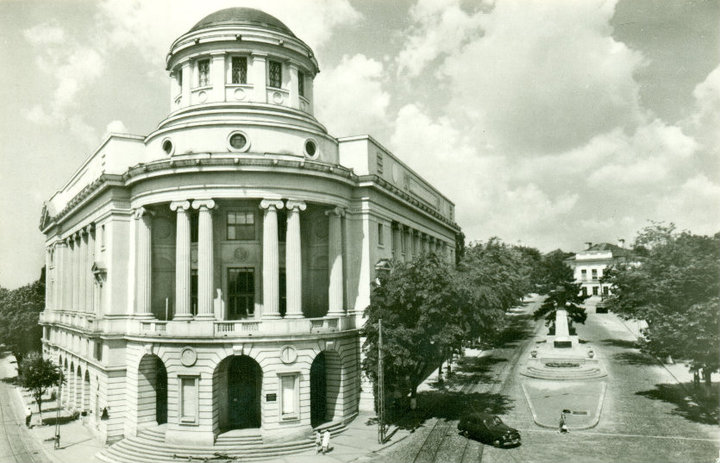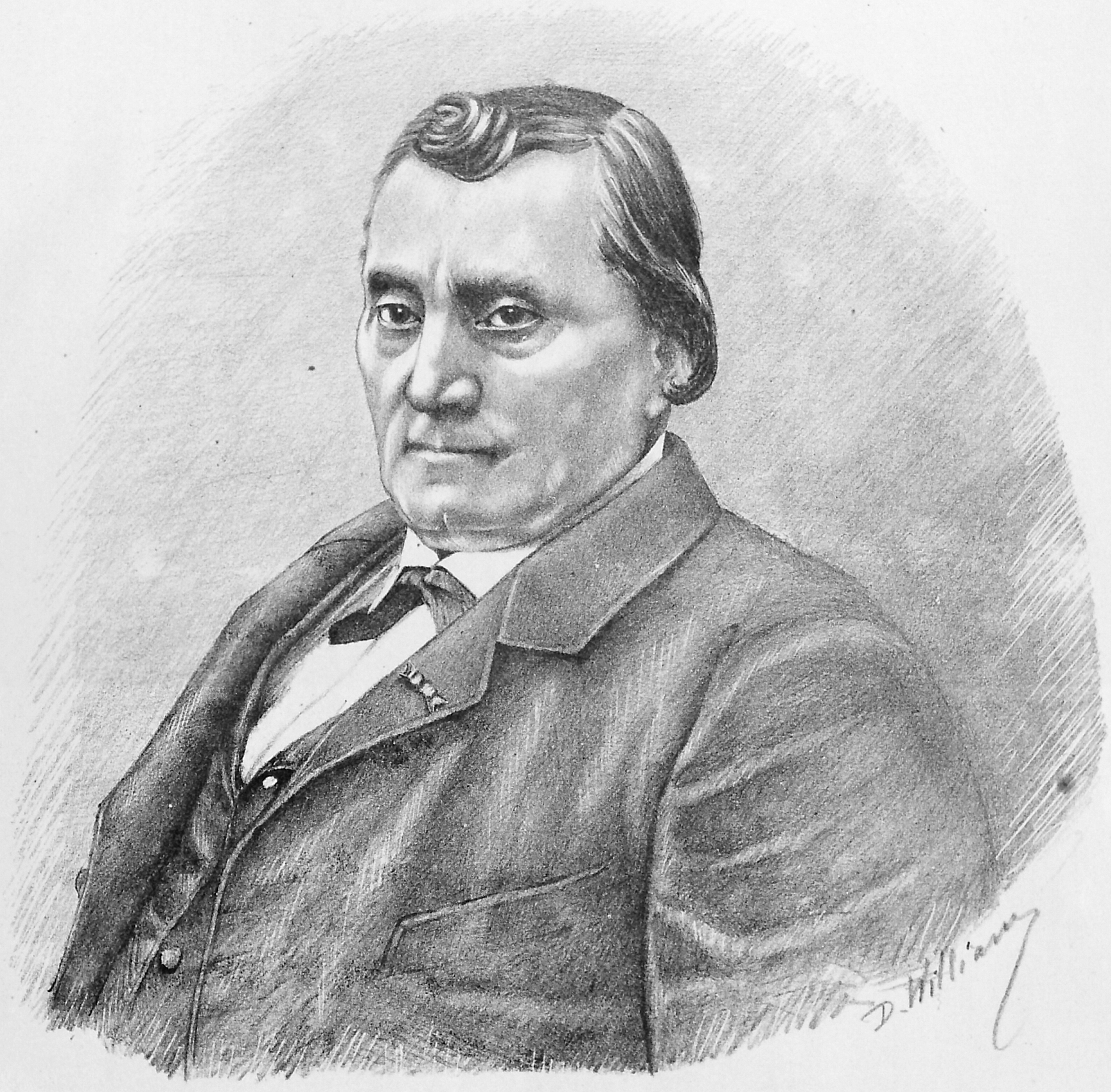|
Radu Stanca National Theatre
The Radu Stanca National Theatre ( ro, Teatrul Național "Radu Stanca" Sibiu, abbreviation: TNRS) is a theatre in Sibiu, Romania, which began construction in 1788. It is one of the longest-standing theatres in Romania and one of the main structures that have contributed to the rise of the Sibiu International Theatre Festival. It is presently managed by Constantin Chiriac and its repertory includes performances in both Romanian and German. History In 1788, typographer Martin Hochmeister laid the foundation of a building dedicated to performances, as in one year he redesigned the function of the Thick Tower, which was part of the city's medieval fortification walls. From this point on, the German-language cultural life of the town of Hermannstadt started growing, as city dwellers saw a varied repertory, inspired from both classical and contemporary works. Thus, the works of great authors, such as Shakespeare and Molière, or of iconic representatives of German Romanticism found an ... [...More Info...] [...Related Items...] OR: [Wikipedia] [Google] [Baidu] |
Sibiu
Sibiu ( , , german: link=no, Hermannstadt , la, Cibinium, Transylvanian Saxon: ''Härmeschtat'', hu, Nagyszeben ) is a city in Romania, in the historical region of Transylvania. Located some north-west of Bucharest, the city straddles the Cibin River, a tributary of the river Olt. Now the capital of the Sibiu County, between 1692 and 1791 and 1849–65 Sibiu was also the capital of the Principality of Transylvania. Nicknamed ''The City with Eyes'', the city is a well-known tourist destination for both domestic and foreign visitors. Known for its culture, history, gastronomy and diverse architecture, which includes the iconic houses with eyes that gave Sibiu its nickname, the city has garnered significant attention since the beginning of the 21st century. In 2004, its historical center began the process of becoming a UNESCO World Heritage Site. Sibiu was designated the European Capital of Culture in 2007. One year later, it was ranked "Europe's 8th-most idyllic place to li ... [...More Info...] [...Related Items...] OR: [Wikipedia] [Google] [Baidu] |
Romania
Romania ( ; ro, România ) is a country located at the crossroads of Central Europe, Central, Eastern Europe, Eastern, and Southeast Europe, Southeastern Europe. It borders Bulgaria to the south, Ukraine to the north, Hungary to the west, Serbia to the southwest, Moldova to the east, and the Black Sea to the southeast. It has a predominantly Temperate climate, temperate-continental climate, and an area of , with a population of around 19 million. Romania is the List of European countries by area, twelfth-largest country in Europe and the List of European Union member states by population, sixth-most populous member state of the European Union. Its capital and largest city is Bucharest, followed by Iași, Cluj-Napoca, Timișoara, Constanța, Craiova, Brașov, and Galați. The Danube, Europe's second-longest river, rises in Germany's Black Forest and flows in a southeasterly direction for , before emptying into Romania's Danube Delta. The Carpathian Mountains, which cross Roma ... [...More Info...] [...Related Items...] OR: [Wikipedia] [Google] [Baidu] |
Sibiu International Theatre Festival
The Sibiu International Theatre Festival ( ro, Festivalul Internațional de Teatru de la Sibiu) is one of the most important theatre and performing arts festivals in the world, and the third biggest, after the Festival d'Avignon and the Edinburgh International Festival. FITS takes place in the city of Sibiu, Romania, in June every year and lasts for ten days. Founded in 1993 by Constantin Chiriac, the festival programme features renowned names of the international stage, offering spectators a broad range of sections, with guests from around 73 countries per edition, performing approximately 550 events. History In March 1993, Constantin Chiriac organized the National Student Theatre Festival. The participants to this first edition of the festival represented no more than two countries (Republic of Moldova and Romania), and in 1994, the number of participating countries rose to eight, while the following two editions had guests from 21, and 24 countries, respectively. In 1994, the Na ... [...More Info...] [...Related Items...] OR: [Wikipedia] [Google] [Baidu] |
Vasile Alecsandri
Vasile Alecsandri (; 21 July 182122 August 1890) was a Romanian patriot, poet, dramatist, politician and diplomat. He was one of the key figures during the 1848 revolutions in Moldavia and Wallachia. He fought for the unification of the Romanian Principalities, writing "Hora Unirii" in 1856 and giving up his candidacy for the title of prince of Moldavia, in favor of Alexandru Ioan Cuza. He became the first minister of foreign affairs of Romania and was one of the founding members of the Romanian Academy. Alecsandri was a prolific writer, contributing to Romanian literature with poetry, prose, several plays, and collections of Romanian folklore, being considered, alongside Mihai Eminescu, which admired and was inspired by the writings of Alecsandri, as one of the most important Romanian writers in the second half of the 19th century. Early life Origins and childhood Alecsandri was born in the Moldavian town of Bacău and he was of Greek origin. His parents were Vasile Alecsandri ... [...More Info...] [...Related Items...] OR: [Wikipedia] [Google] [Baidu] |
Mihai Eminescu
Mihai Eminescu (; born Mihail Eminovici; 15 January 1850 – 15 June 1889) was a Romanian Romantic poet from Moldavia, novelist, and journalist, generally regarded as the most famous and influential Romanian poet. Eminescu was an active member of the Junimea literary society and worked as an editor for the newspaper ''Timpul'' ("The Time"), the official newspaper of the Conservative Party (1880–1918). His poetry was first published when he was 16 and he went to Vienna, Austria to study when he was 19. The poet's manuscripts, containing 46 volumes and approximately 14,000 pages, were offered by Titu Maiorescu as a gift to the Romanian Academy during the meeting that was held on 25 January 1902. Notable works include '' Luceafărul'' (''The Vesper/The Evening Star/The Lucifer/The Daystar''), ''Odă în metru antic'' (''Ode in Ancient Meter''), and the five ''Letters'' (''Epistles/Satires''). In his poems, he frequently used metaphysical, mythological and historical subjects. H ... [...More Info...] [...Related Items...] OR: [Wikipedia] [Google] [Baidu] |
Matei Millo
Matei Millo (; November 24/25, 1814 – September 9, 1896) was a Moldavian, later Romanian stage actor and playwright. Born in Stolniceni-Prăjescu, Iași County, his grandfather was the poet Matei Milu; his parents were Vasile Millo and Zamfira (''née'' Prăjescu). He was first educated by private tutors at home, then at a private boarding school in Iași from 1833 to 1834, followed by Academia Mihăileană from 1835 to 1836. While living in Paris from 1840 to 1845, he studied theatre, took private lessons, followed the great actors of the day (Frédérick Lemaître, François Jules Edmond Got, Hugues Bouffé, Pierre-Alfred Ravel) and probably played minor roles with French troupes. In 1846, after returning home, he began organizing the theatre in the Danubian Principalities, first at Iași until 1852, and then at Bucharest. From 1864 to 1866, he taught at the National University of Music Bucharest, Bucharest Conservatory, while in 1877 he established an associated artists' trou ... [...More Info...] [...Related Items...] OR: [Wikipedia] [Google] [Baidu] |
Radu Stanca
Radu Stanca (March 5, 1920 – December 26, 1962) was a Romanian poet, playwright, theatre director, theatre critic and theoretician. He was born in Sebeș and died in Cluj-Napoca. Stanca was member of the Sibiu Literary Circle, a movement of young poets and essayists who tried, between 1946–1948, to rejuvenate the main literary style and aesthetical thinking. In 1947 he received the ''Lovinescu'' award for his tragicomedy ''Dona Juana''. One of the leading Romanian theatres is the ''Radu Stanca National Theatre'' in Sibiu Sibiu ( , , german: link=no, Hermannstadt , la, Cibinium, Transylvanian Saxon: ''Härmeschtat'', hu, Nagyszeben ) is a city in Romania, in the historical region of Transylvania. Located some north-west of Bucharest, the city straddles the Ci .... References Ion Vartic, ''Radu Stanca. Poezie și teatru'', București, Ed. Albatros, 1978 Romanian dramatists and playwrights Romanian essayists Romanian writers 1920 births 1962 deaths 20th-cent ... [...More Info...] [...Related Items...] OR: [Wikipedia] [Google] [Baidu] |
Andrei Serban
Andrei Șerban (born June 21, 1943) is a Romanian-American theater director. A major name in twentieth-century theater, he is renowned for his innovative and iconoclastic interpretations and stagings. In 1992 he became Professor of Theater at the Columbia University School of the Arts, a position he resigned from in 2019, citing oppressive pressure in the name of "political correctness" on a level which reminded him of communist Romania. Biography Early life Born in Bucharest, he is the son of George and Elpis Șerban. His father came from an old family of Țara Chioarului in Maramureș, studied law at Leipzig, directed a bank and was close friends with Iuliu Maniu, who attended Serban's baptism. After the onset of the communist regime, George was fired and obliged to work as a photographer. His mother came from a family of Greek merchants settled in Tulcea, originally from Cephalonia. She worked as a teacher of Romanian language and literature. As a child, he was presenting pu ... [...More Info...] [...Related Items...] OR: [Wikipedia] [Google] [Baidu] |
Andriy Zholdak
Andriy Zholdak ( uk, Андрій Жолдак, born 18 November 1962) is a Ukrainian theatre director. From 2002 to 2005 he was the director at the Kharkiv Ukrainian Drama Theatre in Kharkiv. In 2006 Zholdak moved to Germany and worked at Theater Oberhausen, Berliner Festspiele and Vienna Festival __NOTOC__ The Wiener Festwochen (Vienna Festival) is a cultural festival in Vienna that takes place every year for five or six weeks in May and June. The Wiener Festwochen was established in 1951, when Vienna was still occupied by the four Allie .... UNESCO Award in Performing Arts (2004). References 1962 births Living people Ukrainian theatre directors {{theat-director-stub ... [...More Info...] [...Related Items...] OR: [Wikipedia] [Google] [Baidu] |
Mihai Măniuțiu
Mihai Maniutiu (born 1954) is a Romanian-born theatre director, writer and theatre/performance theoretician. He has directed over eighty productions in important theatres, many of which have been toured internationally, broadcast on European TV channels, and won numerous awards in the categories for Best Director, Best Production, and Originality. Maniutiu is a professor at the Faculty of Theatre and Television of the Babeș-Bolyai University in Cluj-Napoca, Romania Romania ( ; ro, România ) is a country located at the crossroads of Central, Eastern, and Southeastern Europe. It borders Bulgaria to the south, Ukraine to the north, Hungary to the west, Serbia to the southwest, Moldova to the east, and ... and Artistic Director and General Manager of the Cluj-Napoca National Theatre, National Theatre of Cluj. In addition to teaching directing, acting, and performance studies (MFA & Doctoral Programs) at the Faculty of Theatre and Television of the Babeș-Bolyai University ... [...More Info...] [...Related Items...] OR: [Wikipedia] [Google] [Baidu] |
Alexandru Dabija
Alexandru Dabija (born February 13, 1955) is a stage director and actor in Romanian theater and film. Born in Piatra Neamț, he graduated from the I.L. Caragiale Institute of Theatre and Film Arts in Bucharest. Dabija debuted in 1976 with Philip Massinger's ''Reflection'' at the Youth Theater in Piatra Neamț, winning the Best Director of the Year award. He was general manager of the Odeon Theatre in Bucharest from 1991 to 1994 and from 1996 to 2002. Theater plays directed * ''Avram Iancu'', made by Mihai Măniuțiu (Casandra Theater Studio, 1978) * '' Taifunul'', by Cao Yu (, 1988) * '' Burghezul gentilom'', by Molière (Nottara Theatre, 1989) * ''Ospățul lui Balthazar'', by Benjamin Fondane (Nottara Theatre, 1990) * '' Lola Blau'', by Georg Kreisler ( State Jewish Theater, 1993) * '' Lungul drum al zilei către noapte'', by Eugene O'Neill (Nottara Theatre, 1998) * '' Școala femeilor'', by Molière (Teatrul Mic, 1998) * ''Jucăria de vorbe, a scenario'', directed by Alexan ... [...More Info...] [...Related Items...] OR: [Wikipedia] [Google] [Baidu] |



